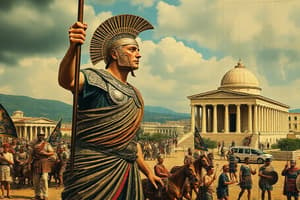Podcast
Questions and Answers
Which city-state focused more on the cult of Heroes, acknowledging its legendary ancestors?
Which city-state focused more on the cult of Heroes, acknowledging its legendary ancestors?
- Athens
- Thebes
- Sparta (correct)
- Corinth
What form of government did Sparta implement?
What form of government did Sparta implement?
- Monarchy
- Theocracy
- Oligarchy (correct)
- Democracy
Which city-state was home to numerous temples dedicated to various gods and goddesses?
Which city-state was home to numerous temples dedicated to various gods and goddesses?
- Thebes
- Sparta
- Athens (correct)
- Corinth
What was the purpose of the Olympic Truce during the Olympic Games?
What was the purpose of the Olympic Truce during the Olympic Games?
Which statement about democracy in ancient Greece is true?
Which statement about democracy in ancient Greece is true?
Which ancient Greek city-state had a social structure designed to create a highly disciplined society with an emphasis on military training for its citizens?
Which ancient Greek city-state had a social structure designed to create a highly disciplined society with an emphasis on military training for its citizens?
What distinguished Sparta from Athens in terms of their form of government?
What distinguished Sparta from Athens in terms of their form of government?
In ancient Greece, where was the Academy, a school of philosophy that encouraged intellectual pursuits, located?
In ancient Greece, where was the Academy, a school of philosophy that encouraged intellectual pursuits, located?
Which city-state in ancient Greece was surrounded by mountains and rocky terrain, leading it towards a focus on agriculture, hunting, warfare, and territorial expansion?
Which city-state in ancient Greece was surrounded by mountains and rocky terrain, leading it towards a focus on agriculture, hunting, warfare, and territorial expansion?
What was the main purpose of the ancient Olympic Games held every four years in Olympia?
What was the main purpose of the ancient Olympic Games held every four years in Olympia?
Flashcards are hidden until you start studying
Study Notes
Ancient Greece
Ancient Greece refers to the civilization that emerged around the 8th century BCE in the eastern Mediterranean region. Its legacy has had a significant impact on Western culture, influencing arts, politics, philosophy, and education. This civilization was organized primarily into independent city-states, including Athens and Sparta, which differed significantly in their political systems and cultural practices. Let's delve deeper into these aspects and explore Greek gods and goddesses, democracy, and the Olympic Games.
Athens
Athens, located in Attica, was one of the most influential city-states in ancient Greece. It was renowned for its philosophers, artists, and architects, making significant contributions to the fields of drama, sculpture, and rhetoric. The city was governed by a democratic constitution, which allowed all male adults to participate in decision-making. Education was highly valued in Athens, with schools teaching subjects like grammar, poetry, music, astronomy, and gymnastics. Some famous philosophers associated with Athens include Socrates, Plato, and Aristotle.
Sparta
In contrast, Sparta was a military-oriented city-state, known for its strict training regimen and disciplined soldiers. Spartan males underwent rigorous training from childhood, focused on combat and endurance, ensuring their readiness for war. Despite being powerful militarily, Sparta lacked cultural achievements compared to Athens. However, their military prowess allowed them to maintain control over neighboring territories, extending their sphere of influence.
Greek Gods and Goddesses
While both Athens and Sparta shared religious beliefs rooted in polytheism, they had distinct approaches to worshipping their deities. Athens was home to numerous temples dedicated to various gods and goddesses, reflecting the diverse nature of its inhabitants. Conversely, Sparta tended to focus more on the cult of Heroes, acknowledging the importance of its legendary ancestors in shaping the city-state.
Democracy in Ancient Greece
The political system of ancient Greece was characterized by the widespread adoption of various forms of democracy. While the concept of democracy itself is often attributed to the Athenians, it was not a uniform or consistent practice across different city-states. For instance, Sparta implemented oligarchy, restricting political power to a select few elites. Nevertheless, the emergence of democracy in ancient Greece paved the way for later developments, ultimately contributing to the establishment of representative governments seen in modern nations.
Olympic Games
The Olympic Games were among the most important cultural events in ancient Greece. Held every four years, they honored the god Zeus and attracted participants from across the country. These games featured various athletic competitions, including running, shot put, javelin throw, and chariot racing. The political significance of the Olympic Games extended beyond sports, serving as a symbol of unity and peace, with the tradition of the "Olympic Truce" prohibiting warfare among participating city-states during the duration of the games.
With these insights into ancient Greece, we can appreciate the rich tapestry of ideas, traditions, and practices that have shaped our contemporary world. From the democratic ideals of Athens to the martial spirit of Sparta, and the pantheons of gods and goddesses intertwining human lives with divine forces, the remnants of ancient Greece continue to inspire us today.
Studying That Suits You
Use AI to generate personalized quizzes and flashcards to suit your learning preferences.



